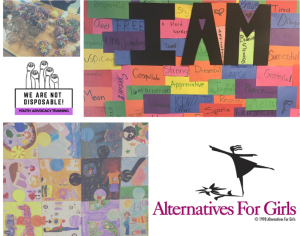Get to Know a Grantee: Alternatives for Girls
Body
The RHY Clearinghouse developed the Get to Know a Grantee questionnaire to illustrate the great variety of youth-serving FYSB grantees, to share their insights on the work that they do, and to inspire collaboration and the sharing of experiences and ideas. We regularly share responses from grantees in the hope that you’ll learn more about the needs of runaway and homeless youth or, if you’re a grantee, that you’ll find some new approaches or ideas to inspire the work you do on behalf of vulnerable youth in your community. Contact us if you’d like to be featured.
For this edition of Get to Know a Grantee, we spoke with Celia Thomas, Chief Operating Officer of Alternatives for Girls (AFG) in Detroit.
NCHYF: How long have you had a FYSB grant?
CELIA THOMAS: AFG was founded in 1987. Our Shelter department is a continuum comprising a Basic Care Center (BCC)/Emergency Shelter, a Transitional Living Program (TLP), including a specialized TLP-Maternity Group Home (MGH) and a Rapid Rehousing (RRH) program. AFG first received FYSB Runaway and Homeless Youth (RHY) funding in the TLP in 1998. Since that time, we have been able to secure and effectively manage our BCC, TLP, TLP-MGH, and Street Outreach Program (SOP) with many cycles of FYSB funding. Today, FYSB RHY funds support AFG’s BCC, TLP-MGH, and SOP.
NCHYF: What other sources of funding are essential to your program?
THOMAS: We utilize other public grants, private grants from large and small foundations, and diversified fundraising to supplement the services offered within the FYSB-funded RHY programming and across our organization. We also embrace a systems-thinking mindset to avail ourselves of collaborations across other systems of care (such as physical and mental health care, education, workforce development, and the business community), and we take in-kind donations to enhance services and provide resources for our participants. Our 30-plus-year track record of good performance and positive outcomes for our participants affords us supportive donors and committed volunteers. The shelter continuum and a majority of our programming have been sustainable since our inception as a result of this performance and funding model.
NCHYF: What’s the primary need of homeless youth in your community?
THOMAS: AFG is actively engaged with our local Continuum of Care to address the needs of homeless youth in our community. We are aware of needs that include a lack of shelter beds for minor (unaccompanied) runaway and homeless youth, a lack of coordinated systems of care for youth under 25 years old, and a lack of safe, stable, youth-specific housing resources beyond the shelter and TLP.
NCHYF: What has been your most important collaboration with a local partner?
THOMAS: With more than three decades of service to girls and young women in the community, we have a wide variety of effective collaborations with local partners ranging from fellow nonprofits to individuals who are dedicated to serving our target population. We could try to name all of our partners but don’t want to risk offending any who get left out. Therefore, we would like to give special acknowledgements to our other RHY-specific local service providers: the Ruth Ellis Center for their ongoing support on LGBTQ and general topics for RHY experiencing homelessness; Covenant House Detroit for their ongoing support in street outreach as we have responded to decreased funding in our TLP; and our newest RHY-serving nonprofit, the Detroit Phoenix Center for its gutsy, grassroots arrival on the scene as an asset-based resource drop-in center.
NCHYF: What sets your organization apart from other similar organizations?
THOMAS: AFG maintains a gender-specific approach that is designed to help our participants avoid violence, teen pregnancy, and exploitation, and help them to explore and access the support, resources, and opportunities necessary to be safe, to grow strong, and to make positive choices in their lives. In addition to a focus on RHY, we work with girls who are at risk of gang involvement, abusing drugs or alcohol, early pregnancy, and school truancy. We engage them through after-school programs, college prep programs, mentoring, and a summer camp. Furthermore, we help teens and women engaged in high-risk activities, such as street-based prostitution, drug use, and gang involvement, and we support victims/survivors of human trafficking.
NCHYF: What do you wish more people in your community (or the country) understood about youth homelessness?
THOMAS: We want our community to remain open to understanding the needs of our youth and continue to develop systems of care that address youth homelessness. We believe in the importance of incorporating youth voice on youth homelessness and other issues. We also maintain a position of advocacy around prevention and intervention to address youth homelessness and other issues. Our focus is on educating the community on topics that can positively impact the effects of youth homelessness, such as Positive Youth Development, Responding to Adverse Childhood Experiences, Trauma Informed Care/Healing-Centered Engagement, and Harm Reduction.
